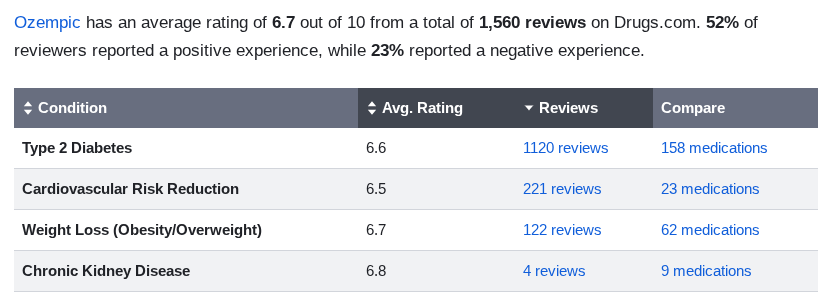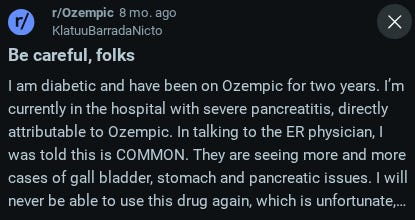Ozempic, The Side Effects We Aren't Talking About
73% of users wished their doctor had told them about these hidden side effects before starting Ozempic.
Welcome to the Healthy Aging Newsletter, Dr. Ashori’s free publication that turns trustworthy medical research into simple habits so adults in their 30s and 40s can stay healthy and avoid common chronic conditions.
The Ozempic Reality Check
SA lost 42 pounds in 6 months on Ozempic, only to plateau, and now she’s slowly gaining it all back. What’s worse is her chronic fatigue and hair that still hasn't grown back. Her lack of appetite for foods she used to enjoy has left her feeling a void in the joy of sharing meals with her friends.
I just want my old self back - this is not what I expected!
Stats: 15 million Americans now on GLP1 drugs, a $13.4 billion market.
The critical question: What aren't patients being told about the full scope of side effects and long-term consequences of such medications?
Beyond the Standard Warnings
In all fairness, a simple medication like omeprazole has even worse reviews than Ozempic. The goal of this article is to balance the highly positive media reviews of such weight loss drugs with real patient stories.
1. Long-Lasting Gut Changes
Gastroparesis is the slowing of the motility of the gut and it’s the main reason for side effects such as diarrhea, nausea, acid reflux, or constipation when taking Ozempic. While for most it resolves after stopping this prescription, for others it can last months.
Some report permanent changes to stomach emptying that doesn’t resolve despite having come off of the medication over 2 years ago.
Finally, "nausea" can be a lasting effect while on the medication and an exhausting feeling to deal with when it happens daily. For those with uncontrolled Diabetes, Ozempic’s side effects might be justified, but perhaps not for everyone.
2. Psychological Rollercoaster
Since Ozempic directly affects hormone levels such as GLP1, PYY, and ghrelin, mood swings from rapid hormonal changes can happen. Many will adjust quickly but some will experience them for much longer.
Food anxiety and obsessive thoughts are a common reported phenomenon as well, one of the main reasons people quit Ozempic. It’s unpleasant to be disgusted by the thought of eating or thinking about food but not having the appetite to consume it.
Body dysmorphia from rapid changes and gravity towards positive attention can also interfere with our normal sense of ourselves. Certainly, there are many success stories here as well but I find that 25% of my patients didn’t anticipate the psychological side effects of Ozempic.
3. Despising Socializing
Eating out isn’t easy when you get nauseated with meals or don’t even have an appetite. Socializing with friends takes a hit and we know the importance of socializing.
This strains the relationships we have with people because of how others view our weight loss journey through their own eyes. You are on a medication and some will expect you to just keep on losing weight. You’re hopeful because of everything you’ve read and heard - the last thing you want is to set yourself up for failure.
The Underreporting Crisis
Why You're Not Getting the Full Picture
Compounding pharmacies bypass FDA reporting, which means a lot of side effects go unreported. Many obtain the medication illegally so doubt is created as to whether it’s the impurities of the “peptide” shot or the actual Ozempic side effect.
Patients also minimize "minor" issues to avoid losing their refills. In the beginning the urge to finally get a hold on weight loss is immense and people can overlook certain side effects. Once the weight loss plateaus, it’s much tougher to cope.
In the US, few patients have long-term follow-up with their physician. They often go to an ER, then an Urgent Care, a walk-in clinic, change insurance companies, and all the while there is more data collecting on them but it’s not in a central database that’s easy to access.
Some may even be in denial about very serious side effects such as pancreatitis, even if it’s rare.
The Side Effects Nobody Warns You About
Hair loss lasting 6+ months. Rapid weight loss is almost always associated with hair loss, more so in women than men, often referred to as telogen effluvium. The whole process doesn’t begin until 2-3 months after the rapid weight loss and we’d expect the hair follicles to go back to normal within 6 months. Yet, some women complain that their hair loss never fully recovered.
If you’re losing a ton of hair, YES- Ozempic IS the cause. -Reddit.
Severe fatigue. Due to nutritional shifts and hormonal turbulence, it’s expected for some patients to experience lasting fatigue even after being on Ozempic for a few months. We believe it’s because not everyone recovers their hormone level the same.
Rebound weight gain. This is a well-known phenomenon and patients and doctors both seem to be aware of this. But imagine yourself dropping 75 lbs and developing Ozempic side effects forcing you to stop. That 75 lbs, plus more, can sometimes come back with a vengeance. This can become a difficult insulin sensitivity rollercoaster ride.
The Hidden Costs of Ozempic
The Generic Drug Fallacy
It’s rare to see popular drug patents expire to reveal affordable generic drugs - that’s a thing of the past. Drug demands fuel drug prices and even if health insurance companies decide to cover it, they’ll only add it in higher tier plans, forcing higher health insurance premiums.
Hopefully, as more alternative drugs come to the market we’ll see some drops in prices, but it likely won’t be significant.
Average lifetime cost: $89,000+
The Health Tradeoffs
Obesity is a small driver of overall health outcomes, despite what’s popularized in health media. What we eat, stress, and our activity levels are far stronger drivers. In my practice, patients with obesity who are active and lead an otherwise healthy lifestyle tend to have minimal signs of inflammation, insulin resistance, and visceral fat.
Multiple Doctor & Lab Visits
To properly prescribe and monitor medications like Ozempic, it’s necessary to have multiple follow-up visits with your physician, a dietician, and a personal trainer, all to ensure that you’re not losing excess muscle loss with it, not developing side effects, and making sure you get off of it when it’s time.
The Marketing vs. Reality Gap
There is no medication in existence with a side effect profile of only 10%. What this endocrinologist below likely tried to communicate to the patient is that the severe symptoms were only 10%. Unfortunately, severity is in the eye of the beholder.
Overhyped Success Stories
What we hear about most are the success stories. Understandably, nobody wants to share an article talking about the 40% drop-out rate due to side effects or the average nationwide “weight loss rate” that’s on par with many of the older weight loss medications still in use.
The Action Fallacy
Time and attention are finite resources. When you visit your doctor and leave with Ozempic for weight loss then that’s the high-level action you took for your health. What you didn’t do is the dietary change, the increase in activity, stress management, sleep, and mindfulness practice.
Weight loss by itself doesn’t always mean you’ll be healthier. There are healthy and unhealthy ways of achieving weight loss.
The Nutrition Paradox
We can no longer ignore the new science of gut health, gut microbiome, and the chemicals produced in this environment. Medications like Ozempic decrease motility of the intestine, changing the way the microflora function. It also curbs your appetite, but most patients end up eating the same quality food, just in lower quantities.
Nutrient deficiencies rapidly rise to the surface because if you don’t change the underlying diet, you’ll just consume less ultraprocessed foods, missing out on important minerals, phytochemicals, vitamins, and other micronutrients.
Your Ozempic Action Plan
If you’re going to take Ozempic or similar weight loss medications, choose a doctor experienced using this medication long-term and come up with a strategy that covers onboarding, maintenance, and coming off the medication, eventually.
Before Starting Ozempic
1. Work with a nutritionist: Repair any poor nutrition habits. Meal timing, appetite management, portion control, and food composition are all important and not too difficult to implement if you start small, take note of setbacks, and design a strategy that works best for you. It’s not about perfection but gradual improvements.
2. Create your exit strategy: Know when you’ll taper off this medication, otherwise you’ll end up on Ozempic for the rest of your life. Which can be a lifesaving medication for certain patients but a major hindrance for others.
3. Establish exercise routine: Focus on activity habits that aren’t motivated by weight loss but overall health. Healthy Aging happens when we do what’s right for the body, not when we are focused on surrogate markers.
While Taking Ozempic
Work with a doctor who titrates the medication slowly
Track biomarker and symptoms to catch early side effects
Track nutrient levels monthly with a food journal
Build sustainable habits, not just weight loss
Pay attention to hunger signals and plan to use them in the future
Tapering Off Ozempic
The eventual goal for most prescription medication is to come off of them. True, that’s not always possible, but we know that polypharmacy is a major problem in our modern society, with more harm than help in most cases.
When should you come off of Ozempic? The best biomarkers are visceral fat, insulin resistance, and waist circumference. Once these start normalizing you and your doctor can attempt a slow taper, replacing each milligram with a pound of newly acquired habits. There is no shame in trial and error until you figure out what works best for you.
The Bottom Line
Ozempic isn't a magic bullet but a great tool among many other tools we have in clinical medicine to help our patients on their Healthy Aging journey. It works best when combined with lifestyle changes which you can slowly adopt as you titrate up and eventually off Ozempic.





